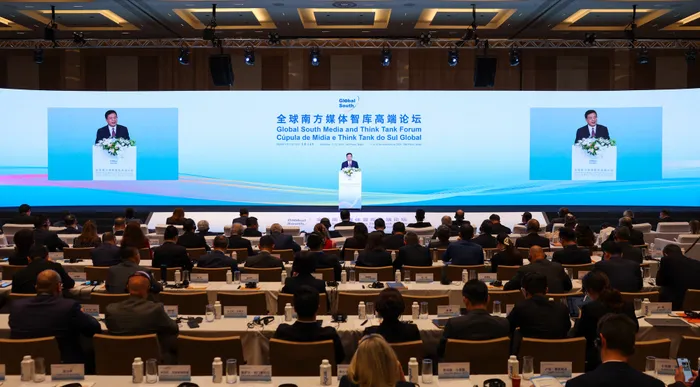Cooperation and mutual benefit: Jointly promoting new development of the Global South

Fu Hua, President of Xinhua News Agency, delivers a keynote speech during the inaugural Global South Media and Think Tank Forum in Sao Paulo, Brazil on November 11, 2024. There is a need to reform global governance institutions such as the IMF, the World Bank and the World Trade Organization (WTO) among others to better reflect the contribution and the position of the Global South in the global economy, says the writer. Picture: Huang Jingwen / XINHUA
Prof. David Monyae
Although the Global South – Africa, Latin America, Asia, and the Caribbean – is still facing immense development challenges, it has registered some progress over the last six decades.
As of 2023, the Global South has 42 per cent of the global GDP, 44 per cent of goods trade, and 65 per cent of the inflows of FDI. Over the last ten years, economic growth in the Global South has averaged 4.1 per cent. There are projections that by 2030, 3 of the 4 largest economies in the world will be in the Global South – China, India, and Indonesia.
The Global South has redefined itself as the world engine of economic growth. South-South trade now stands at US$5.3 trillion up from US$600 billion in 1995. Although this is still less than the North-South trade which stands at US$8.3 trillion it still represents an important shift in the structure of global trade. This means that Global South countries are less dependent on the Global North countries than they were a few decades earlier. But this growth is uneven with some countries and regions growing much faster than their peers.
Despite the improvements that have been witnessed, the Global South is still facing several challenges. About 700 million (8.5 per cent of the global population) still live in extreme poverty – most of them being in Sub-Saharan Africa. External shocks such as the Russia-Ukraine war and the COVID-19 pandemic have also contributed to rising poverty by disrupting critical supply chains and worsening global energy and food inflation. The Global South is also facing an acute debt crisis with an average of 38 per cent of government revenue going to the servicing of debt instead of developmental projects. In Sub-Saharan Africa that average rises to 54 percent.
Poor and low-income countries spend more (about 12 times) on paying back debt than on addressing climate change (another pressing issue). The collective debt of developing countries reached US$9 trillion in 2022. The G20 and the International Monetary Fund (IMF) introduced the Common Framework for Debt Treatment in 2020 but this has enjoyed limited success thus far with only a handful of countries having benefited. This is compounded by the fact that developing countries are under-represented in institutions such as the IMF and the World Bank which shape global financial policy and act as a global financial safety net.
Moreover, many Global South countries are also facing a huge infrastructure finance deficit. About US$2 trillion is needed to invest in infrastructure annually to support economic growth. Without adequate infrastructure financing, the Global South countries will be trapped in low growth.
Further, the spectre of climate change, which is disproportionately affecting developing countries poses a significant threat to their development prospects. Global South countries hardly have the finances to build the capacity for mitigation and adaptation to climate change. Hence there is a need to mobilize finance at the global level and for the developed countries to honour their pledges of climate finance to the developing countries.
There is a need to reform global governance institutions such as the IMF, the World Bank and the World Trade Organization (WTO) among others to better reflect the contribution and the position of the Global South in the global economy. Groupings like the Group of 77 (G77), the BRICS Plus and the UN Conference on Trade and Development (UNCTAD) could be leveraged to advance the interests of the Global South on the global stage.
There are also global programmes such as the Belt and Road Initiative (BRI) led by China and the Programme for Global Infrastructure Investment (PGII) led by the G7 which could have a positive impact on the development of the Global South.
* Prof. David Monyae is the Director of the Centre for Africa-China Studies at the University of Johannesburg. This is an edited version of his address to the Global South Media and Think Tank Forum, Sao Paulo, Brazil, 11-12 November 2024.
** The views expressed in this article do not necessarily reflect the views of The African.